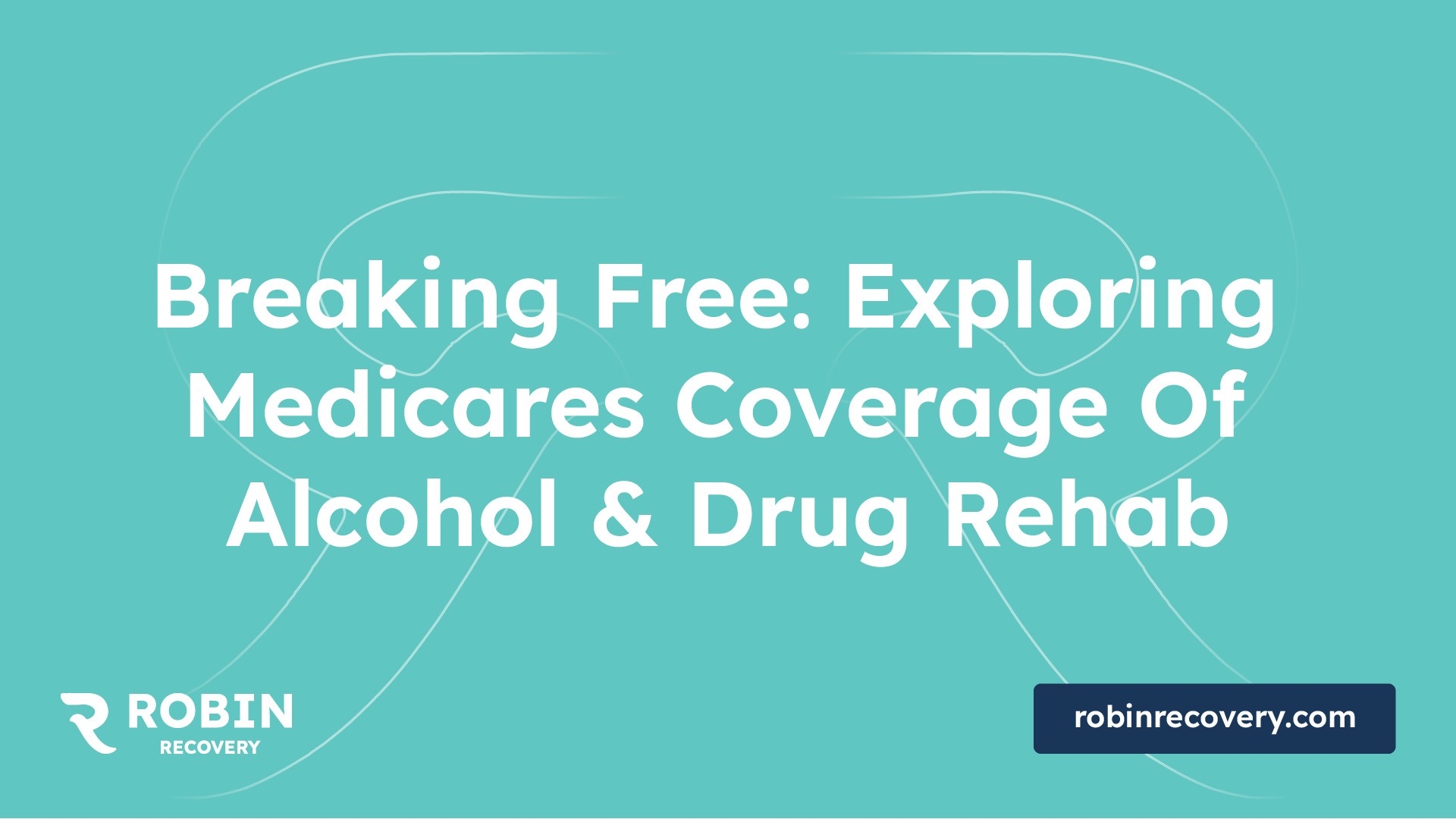Breaking Free: Exploring Medicares Coverage Of Alcohol & Drug Rehab

Understanding Medicare Coverage
Understanding Medicare's coverage for alcohol and drug rehab is crucial for individuals seeking treatment. This section provides an overview of the coverage and eligibility criteria.

Coverage Overview
Medicare may provide coverage for certain aspects of alcohol and drug rehab care, including detox, inpatient rehab, outpatient rehab, and certain medications used in treatment. However, coverage can vary depending on individual circumstances.
Medicare Part A covers care in an inpatient rehab center including room and board, meals, therapy, and other necessary treatments, if the facility accepts Medicare. On the other hand, Medicare Part B may cover outpatient services like counseling, therapy sessions, and medication-assisted treatment.
Furthermore, Medicare Part C (Medicare Advantage) plans are required to cover everything Original Medicare covers, including substance use disorder treatment services like inpatient and outpatient rehab. This can be beneficial for individuals who need more extensive services.
While Medicare covers some costs associated with alcohol and drug addiction treatment, there may be out-of-pocket expenses such as deductibles, copayments, and coinsurance. Medicare Advantage plans may offer additional benefits beyond what Original Medicare offers.
Eligibility Criteria
Medicare coverage for alcohol and drug rehab is available to eligible individuals. In most cases, eligibility for Medicare is based on age (65 and older) or disability status. However, coverage for substance use disorder treatment is not restricted to these groups.
If you are unsure about your eligibility, it's recommended to contact Medicare directly or consult with a healthcare professional. For those who have no insurance or are underinsured, the SAMHSA National Helpline can refer you to facilities that accept Medicare or Medicaid for substance use disorder treatment [2].
Knowing whether Medicare covers alcohol and drug rehab can be a significant factor in the decision-making process for treatment. It's important to explore all available options and understand the specifics of your coverage. Keep in mind that while Medicare can help cover the costs of treatment, the journey to recovery also requires commitment and dedication.
Inpatient Rehab Coverage
When examining the question of "does Medicare cover alcohol & drug rehab?", it's essential to understand the various aspects of Medicare coverage, starting with inpatient rehab coverage.
Medicare Part A Coverage
Medicare Part A coverage includes care in an inpatient rehab center. This includes various necessities such as room and board, meals, therapy, and other necessary treatments, provided the facility accepts Medicare.
Medicare Part A allows for a total of no more than 190 days of treatment from a specialty treatment facility under inpatient drug and alcohol rehabilitation programs, with this being the lifetime limit.
Necessary Treatments Covered
The specific treatments covered under Medicare Part A include medically necessary care in an inpatient rehabilitation facility for individuals with a medical condition requiring intensive rehabilitation, continued medical supervision, and coordinated care from healthcare providers.
This care includes treatment for individuals recovering from serious surgeries, illnesses, or injuries who need intensive rehabilitation therapy programs, physician supervision, and coordinated care from doctors and therapists.
This means that detox, therapy, aftercare planning, and more are covered under Medicare Part A for individuals receiving inpatient drug and alcohol rehabilitation services.
This in-depth look into inpatient rehab coverage under Medicare Part A provides a comprehensive answer to the question, "does Medicare cover alcohol & drug rehab?". For further information regarding outpatient rehab coverage and other aspects of Medicare, continue reading the subsequent sections.
Outpatient Rehab Coverage
Outpatient rehab offers the flexibility to receive treatment while continuing with daily life activities. Medicare provides coverage for various outpatient services through Medicare Part B.
Medicare Part B Coverage
Medicare Part B is instrumental in covering outpatient treatment for drug and alcohol rehabilitation. This includes outpatient mental health counseling, alcohol misuse screenings, and intensive outpatient programs. It also covers services such as alcohol misuse assessment and counseling sessions [3].
These services are designed to provide a comprehensive approach to addiction recovery, addressing both the physical and psychological aspects of substance abuse.
Counseling Services
Counseling services covered by Medicare Part B include both individual and group therapy sessions. These sessions can provide essential support, coping strategies, and relapse prevention techniques for individuals recovering from alcohol and drug addiction.
Individual counseling offers one-on-one support, while group counseling provides a platform to share experiences and gain insights from others who are also on the path to recovery. Both forms of counseling can be beneficial for individuals in outpatient rehab.
Medication-Assisted Treatment
Medication-assisted treatment (MAT) is an effective approach to managing substance abuse, particularly when combined with counseling and behavioral therapies. MAT involves the use of medication, approved by the Food and Drug Administration (FDA), to treat substance use disorders and prevent overdose.
Medicare Part B provides coverage for MAT, ensuring that individuals in outpatient rehab have access to these useful treatment options. This approach can significantly improve patient survival rates, increase retention in treatment, and decrease illicit opiate use and other criminal activities among people with substance use disorders.
In conclusion, Medicare Part B offers extensive coverage for outpatient alcohol and drug rehab services. This includes counseling, screenings, assessments, and medication-assisted treatments. These services can provide invaluable support for individuals on their journey to recovery. Remember to consult with a healthcare provider or Medicare representative to understand the full extent of coverage available to you.
Medicare Advantage Plans
Medicare Advantage, also known as Medicare Part C, extends the coverage of Original Medicare (Parts A and B) to include additional health services. This extension also applies to the treatment of substance use disorders, including alcohol and drug rehab.
Coverage Extensions
Medicare Advantage plans are required to cover everything Original Medicare covers, including services for substance use disorder treatment like inpatient and outpatient rehab. In addition to the coverage offered by Medicare Parts A and B, Medicare Advantage plans can aid with the costs of alcohol and drug rehab. These plans offer coverage for necessary treatment services, which can be crucial for those seeking help with substance addiction.
Additionally, Medicare Part D, which can be included in many Medicare Advantage plans, provides coverage for medications used in treating substance use disorders. This includes drugs for opioid and alcohol use disorders. Different drug plans under Part D have their own list of covered medications, known as a formulary [3].
Additional Benefits
Beyond the basic coverage for substance use disorder treatments, Medicare Advantage plans offer additional benefits that can support a comprehensive approach to recovery.
These benefits include prescription drug coverage, which can be essential for those recovering from substance use disorders. Depending on the specific plan, coverage may also extend to dental, vision, and hearing services [1].
Such additional benefits can complement the primary treatment services, providing a holistic approach to recovery. However, it's important for individuals to review the details of their Medicare Advantage plan to understand the extent of the coverage and the services that are included.
In conclusion, when asking "does medicare cover alcohol & drug rehab?", the answer is yes, especially with Medicare Advantage plans that provide extended coverage and additional benefits. It's always recommended for individuals to review their plan details to ensure they are maximizing their benefits and getting the comprehensive support they need for recovery.
Out-of-Pocket Expenses
While it's clear that Medicare can cover a substantial portion of the costs associated with alcohol and drug rehab, it's essential to understand that there might still be out-of-pocket expenses. These can include deductibles, copayments, and coinsurance costs.
Deductibles and Copayments
A deductible is the amount you must pay for healthcare services before your Medicare coverage begins. It's an annual amount, and it can vary depending on your specific Medicare plan. Once your deductible is met, you typically pay a copayment or coinsurance for covered services.
A copayment is a fixed amount you pay for a covered service, like a doctor's visit or prescription medication. The amount can vary depending on the type of service.
These costs can add up, especially if you require extensive treatment or medications for your addiction.
Coinsurance Costs
Coinsurance is your share of the costs of a healthcare service. It's usually a percentage (for example, 20%) of the cost of the service, and you pay it after you've paid your deductible.
In the context of alcohol and drug rehab, coinsurance costs can apply to various services, including hospital stays, outpatient treatment, and prescription drugs. As with deductibles and copayments, the exact amount can depend on your specific Medicare plan and the treatments you need.
It's important to note that these are general figures and can vary depending on the specifics of your Medicare plan and the nature of your treatment. For more accurate information, consider consulting with a healthcare provider or Medicare representative.
Remember, while Medicare can provide substantial support in covering the costs of alcohol and drug rehab, planning and understanding your potential out-of-pocket costs can help ensure you get the care you need without undue financial strain. (Arms Acres)
Additional Support
Apart from the coverage provided by Medicare for alcohol and drug rehab, there are additional support resources available for those seeking help for their substance use disorders. These resources can provide further assistance, whether it's in finding the right treatment facility, understanding the options available, or exploring financial assistance options.
SAMHSA National Helpline
The Substance Abuse and Mental Health Services Administration (SAMHSA) operates a National Helpline that can be an invaluable resource for those in need of treatment for substance use disorders. This helpline can provide referrals to facilities that accept Medicare or Medicaid for substance use disorder treatment if you have no insurance or are underinsured [2].
Referrals for Treatment
Medicare may provide coverage for certain aspects of alcohol and drug rehab care, including detox, inpatient rehab, outpatient rehab, and certain medications used in treatment. However, coverage can vary depending on individual circumstances. A referral to an appropriate treatment facility that accepts Medicare can be instrumental in accessing the necessary care.
Financial Assistance Options
While Medicare covers some costs associated with alcohol and drug addiction treatment, there may be out-of-pocket expenses such as deductibles, copayments, and coinsurance. It's important to fully understand these potential costs and seek financial assistance if needed. Some treatment facilities may offer payment plans or sliding scale fees based on income. Additionally, nonprofit organizations and state-funded programs may provide grants or financial assistance for those in need.
Also, Medicare Advantage (Part C) plans may offer additional benefits beyond what Original Medicare offers. These plans are required to cover everything Original Medicare covers, including substance use disorder treatment services like inpatient and outpatient rehab. This could be an appealing option for those looking for more comprehensive coverage [1].
In the journey to recovery from alcohol and drug addiction, seeking help is the first step. Understanding your Medicare coverage and the additional support available can help pave the way to a successful and sustained recovery.
References
[1]: https://www.armsacres.com/blog/medicare-cover-alcohol-and-drug-rehab
[2]: https://www.samhsa.gov/find-help/national-helpline
[3]: https://americanaddictioncenters.org/rehab-guide/medicare
[4]: https://www.medicare.gov/coverage/inpatient-rehabilitation-care
[5]: https://www.clearstepsrecovery.com/addiction-recovery-blog/insurance-coverage-for-substance-use-treatment
